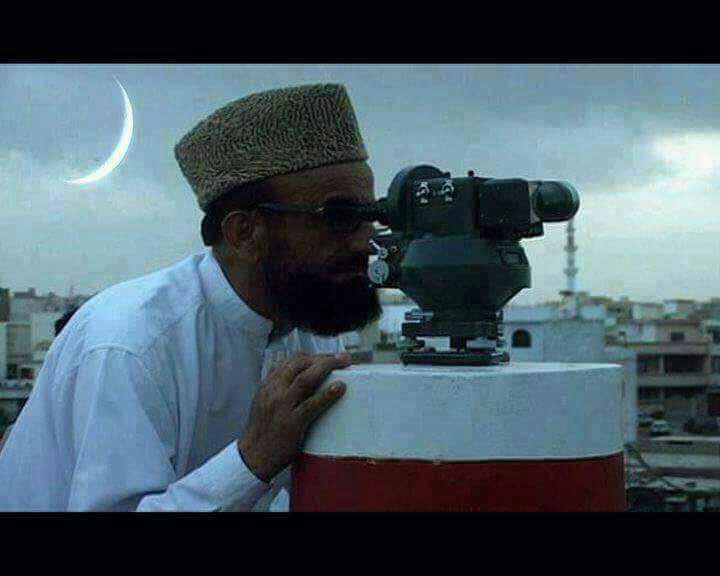With few exceptions, almost every year, Pakistan has witnessed a divisive controversy as to when the holy Islamic month Ramazan should start and end in a country that has a population of over 200 million.
Officially Central “Ruet-e-Hilal” (moon sighting) Committee comprising 24 members Islamic scholars makes a formal announcement whether or not the moon was sighted across the country at the end of the Islamic months Rajab and Ramazan. The date of moonsighting determines whether Muslims would fast for 29 or 30 days in Ramazan.
Three provinces follow the official committee’s decision to start their fasting and celebrate Eid while people in country’s northwestern province Khyber Pukhtoon Khawa (KPK) largely go by the decision of Peshawar-based Qasim Masjid headed by Mufti Shahabuddin Popalzai. The tradition of collecting eye-witness accounts about moonsighting at Qasim Masjid goes back to 1842.
A lingering source of polarization
This year, the government allegedly kidnapped Mufti Shahabuddin Popalzai and expelled him from Pakistan to Dubai, and mistakenly thought that it would end the controversy and help Muslims to celebrate Eid on the same day all over the country. Nonetheless, this did not deter his followers who, as in the past, collected eye-witness accounts from dozens of people across the province and announced that they would celebrate Eid, a day before the rest of Pakistan. His alleged abduction has led to protests in parts of KPK, a region where people are known to be far more particular about adhering to the Islamic injunctions from Quran and sayings of last Prophet Muhammad (peace be upon him) than elsewhere in the country.
There has been growing resentment among people in KPK where all and sundry feel belittled as their eye-witness accounts have been mostly ignored over the course of decades by Central Moonsighting Committee headed by Mufti Muneeb ur Rehman who has been chairing it for the past 16 years.
It is beyond comprehension that people in such a large number would lie every year and say that they sighted the moon in KPK, a region where people generally do not compromise on their religious values. This means that assuming that they lie, is nonsense, to say the least – not to mention an insult to the inhabitants of the province.
Mufti Muneeb has been at the heart of controversy for sowing the seeds of ethnicity and sectarianism by failing to develop consensus on celebrating Eid on the same day. He has been under fire from Awami National Party whose previous provincial government in KPK not long ago officially celebrated Eid on the basis of the announcement made at Qasim Masjid.
Historical baggage
There is no law to govern the central moonsighting committee and it is being run through arbitrary executive orders since 1948, one of the key reasons that the controversy fails to die down. For the first time, Eid was celebrated a day before the rest of Pakistan in 1958 in Peshawar. Residents of Karachi also celebrated Eid three times in defiance of the decision of the Central Committee in the 1960s.
The National Assembly, the lower House of the Parliament passed a resolution during Prime Minister Zulfiqar Ali Bhutto’s government in 1974 to institutionalize and systematize the moonsighting process to forge unity among people. Since then no successive government considered it an issue of public interest and none of them legislated to govern the functioning of moonsighting process to help people to celebrate Eid on the same day.
Methods of moonsighting
Under Islamic law/Sharia, all that is required are eyewitness accounts from two reliable Muslims that they sighted the moon, a condition met by people in KPK. However, how to institutionalize this very fundamental condition for moonsighting has been a challenge for the government over the course of decades.
Under the existing arrangements, Central Moonsighting Committee has four zonal committees in each of the four provinces to sight the moon from all over Pakistan with the help of district administrations. The federal committee is backed by 150 observatories of the Pakistan Meteorological (MET) Department. The role of Pakistan Space and Upper Atmosphere Research Commission (SUPARCO) is equally important in terms of providing an astronomic assessment about the birth of moon which usually disappears within minutes after it surfaces on skies while entering into next month of Islamic calendar.
An official in Ministry of religious affairs confided to this writer that the Central Committee has been relying more on MET office and SUPARCO and less on eye-witness accounts, in a deviation from Sharia law, a key reason behind the controversy.
On the other hand, Islamic scholars, better known as Ulemas, at Qasim Masjid collect eye-witness accounts from all over the province to make their announcement on whether or not the moon was sighted in the province.
The moonsighting is fundamentally a religious issue and it has to be handled religiously in a manner that its results are accepted by all and sundry in Pakistan. Technical reliance on moonsighting has to be a contributing factor and assessments of MET office and SUPARCO should not overshadow human eye-witness accounts, which is a fundamental requirement in Islam. And that is why the heavy reliance on SUPARCO and MET office has led to polarization and sectarian sentiments among people.
Feasible solutions to end the controversy on moonsighting
The federal government should preferably abolish the Central Moonsighting Committee and link the sighting of the moon with the Kingdom of Saudi Arabia where, like KPK Eid, is celebrated a day before the other three provinces of Pakistan. Muslims everywhere in the world have a deepest emotional attachment with Makkah and Madina e Munwara, the two holiest places of Islam. Therefore, there is every likelihood for people in Pakistan to wholeheartedly accept the government’s decision to follow the announcement of Saudi Arabia to start and end their fasting and celebrate Eid on same days which will forge a greater unity in the Muslim world as well. There may be opposition from some religious leaders which would be more on the basis of their sectarian outlook and vested interests than that of being genuinely ideological factors.
Such decision would deprive a fleet of religious scholars from a lot of benefits like projecting themselves through media to make a formal official announcement on moonsighting. Hence there may a mild reaction from them which the government should ignore, given the fact that every year they cause harm to Islam and Pakistan by dividing people on sectarian and ethnic grounds.
If for whatever reasons, this decision is not workable, the central government needs to move fast to legislate the governing and functioning of the moonsighting committee. To begin with, the federal government must mainstream Islamic scholars from Qasim Masjid or seek their nominations to be included in the Central Moonsighting Committee. The federal government in collaboration with provincial government should declare Qasim Masjid as an official Zonal Committee of the province to make it sure that all the eye-witness accounts it receives from KPK land at Central Committee. However, this is unlikely to happen until Mufti Muneeb continues to head the central Committee, therefore, it is high time to replace him with someone with ability to unify the nation on celebrating Eid on same day.














